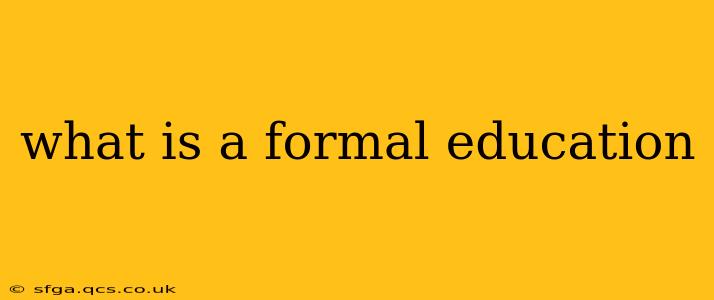Formal education is a structured and systematic process of learning that takes place in an established institution, such as a school, college, or university. Unlike informal learning, which occurs organically through life experiences, formal education follows a pre-defined curriculum, uses standardized assessment methods, and typically leads to the awarding of qualifications or certifications. It's a crucial aspect of individual development, societal progress, and economic growth, shaping individuals' knowledge, skills, and understanding of the world.
What are the Key Characteristics of Formal Education?
Several key characteristics distinguish formal education from other forms of learning:
- Structured Curriculum: A formal education system follows a pre-planned curriculum, outlining the subjects, topics, and learning objectives to be covered. This ensures a consistent and comprehensive approach to learning.
- Qualified Educators: Formal education is delivered by qualified and trained educators who possess expertise in their respective fields. These professionals guide students, assess their learning, and provide feedback.
- Standardized Assessment: Formal education utilizes standardized tests, examinations, and assignments to assess students' learning and progress. These assessments provide benchmarks for evaluating understanding and identifying areas requiring further development.
- Credentialing and Certification: Upon successful completion of a formal education program, students typically receive a certificate, diploma, or degree that recognizes their achievements and validates their knowledge and skills. This credentialing is vital for career advancement and further educational pursuits.
- Defined Learning Environment: Formal education unfolds within a designated learning environment, such as a classroom, laboratory, or online platform. This provides a structured setting conducive to focused learning.
What are the Different Levels of Formal Education?
Formal education is typically structured into several distinct levels:
- Primary Education (Elementary School): This foundational level introduces basic literacy, numeracy, and fundamental knowledge across various subjects.
- Secondary Education (Middle and High School): Building upon primary education, this level expands subject knowledge, introduces more specialized subjects, and prepares students for higher education or vocational training.
- Higher Education (College and University): This level focuses on specialized study within specific disciplines, leading to undergraduate and postgraduate degrees. This often involves in-depth research and advanced skill development.
- Vocational Training: This type of formal education focuses on practical skills and knowledge needed for specific trades or professions. It may include apprenticeships, trade schools, or specialized programs.
What are the Benefits of Formal Education?
Formal education offers a multitude of benefits, impacting both individual lives and societal progress:
- Increased Earning Potential: Individuals with formal education generally have higher earning potential throughout their careers.
- Improved Employment Opportunities: Formal qualifications significantly enhance employment prospects and open doors to a wider range of job opportunities.
- Enhanced Critical Thinking Skills: Formal education cultivates critical thinking, problem-solving, and analytical skills crucial for success in various aspects of life.
- Personal Growth and Development: Formal education fosters personal growth, broadening perspectives, increasing self-confidence, and promoting intellectual curiosity.
- Contribution to Society: Educated individuals are better equipped to contribute positively to society, driving innovation, economic growth, and social progress.
What is the Difference Between Formal and Informal Education?
The core distinction lies in the structure and organization of the learning process. Formal education is structured, institution-based, and credentialed. Informal education, in contrast, is unstructured, occurs organically through daily experiences, and doesn't necessarily lead to formal qualifications. Examples of informal learning include learning a new skill from a friend, gaining knowledge through reading books, or acquiring practical experience on the job.
How Does Formal Education Impact Career Advancement?
Formal education is a cornerstone of career advancement. Higher levels of education often correlate with higher-paying jobs and greater career opportunities. Moreover, specific degrees and certifications are prerequisites for many professions, demonstrating competency and expertise to potential employers.
What are Some Examples of Formal Education Institutions?
Numerous institutions provide formal education, including public and private schools, colleges, universities, vocational schools, and online learning platforms offering accredited programs.
This comprehensive overview highlights the importance and multifaceted nature of formal education, emphasizing its role in individual and societal development. From its structured curriculum and qualified educators to its impact on career prospects and personal growth, formal education remains a cornerstone of modern society.
